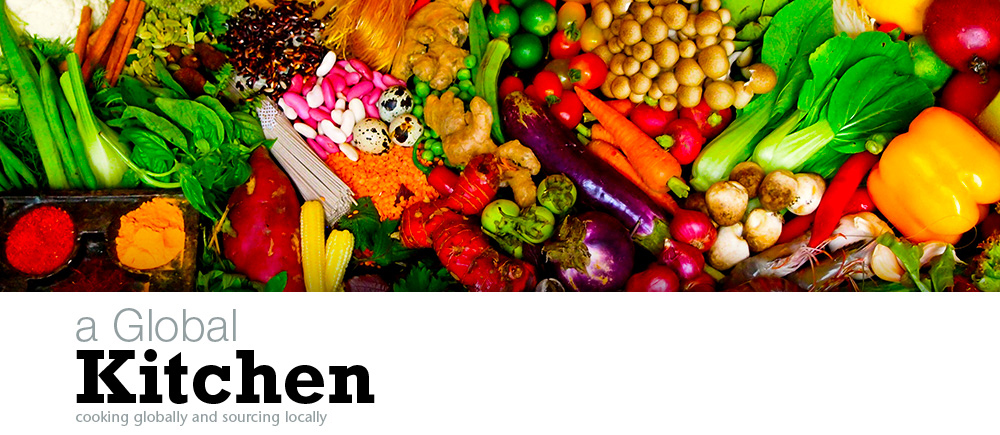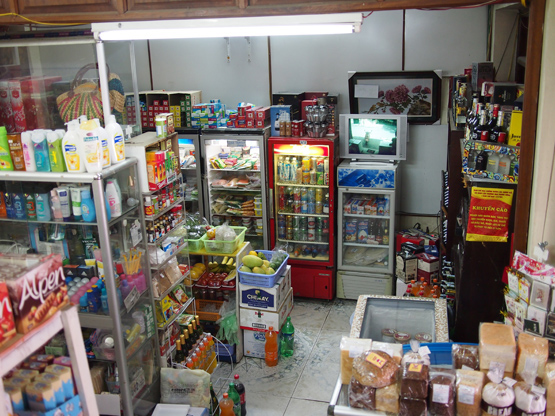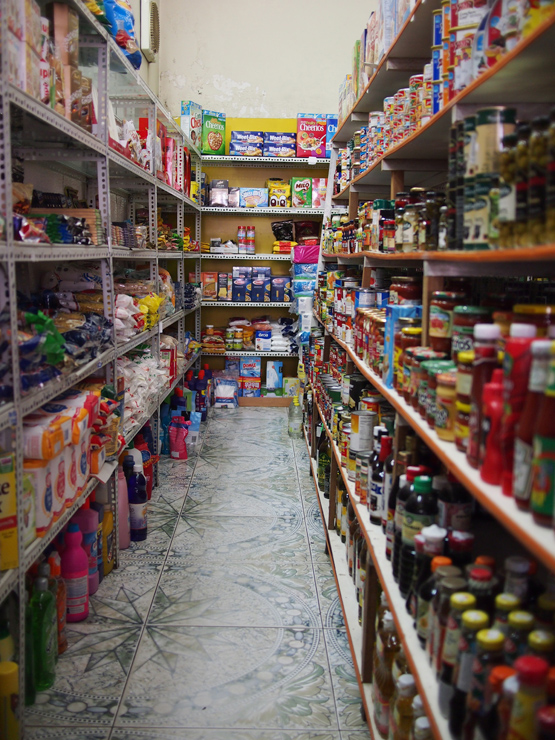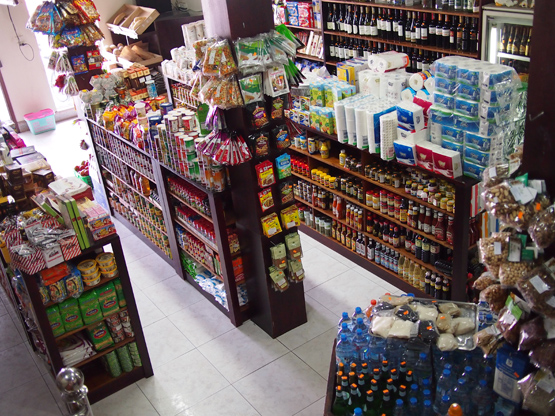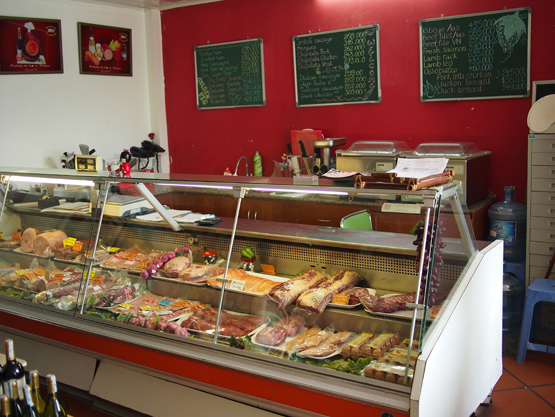Depending on where you call home, grocery shopping in Asia can take more time than you are used to. In North America, Europe or Australia you can do your weekly grocery shopping on the weekend at a single store. However, in most Asian cities that may not even be an option. And when it is, it can be very expensive. Much like how people shopped prior to the introduction of chain grocery stores, you or your cook will probably buy the majority of your groceries 3-4 times a week from small vendors at local markets or ‘mom and pop’ shops.
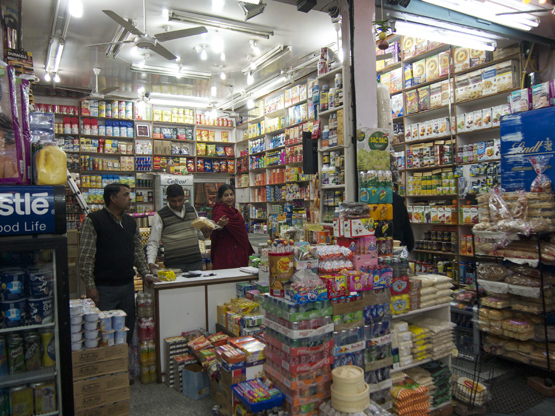
Shop at INA Market in Delhi. Amazing what you could find at a shop like this. In warmer climates certain products can go stale quicker. Best to check best before dates when purchasing. If stale/ off, worth returning as these shops want you to be happy to keep your business.
It pays to develop relationships with the vendors at your local market and smaller grocery stores from the start. My experience has been that once they are aware that you regularly buy from them they charge you the same (or similar) prices as they do with locals and ensure that you have the freshest produce/ products available. It will also be much easier to return the item if it is rotten or has gone off. Whether living in India or Vietnam or somewhere in between, I source the majority of the food for my family from the local wet markets and smaller shops, including specialty shops I know to incorporate organic or other practices.
Where To Buy Groceries
Wet Markets & Pushcart Vendors
The reality of shopping locally can be daunting but wet markets are great places to purchase cheap, fresh fruits, vegetables, seafood and meats. The key is arming yourself with a bit of knowledge. Some vendors’ families are the actual farmers of the produce they are selling though most buy the items from the large wholesale market. The biggest challenge of shopping in such markets is that few of the vendors speak English. If you have not acquired some basic knowledge of the local language communication may be difficult, but possible. Likewise, finding out the origin of the products is tricky as you have to rely on the vendor’s word. While some have lied to me to make the sale others, with whom I have developed a friendly relationship, are honest and forthcoming with information.
Depending on where you are living, pushcart fruit and vegetables vendors may come through your neighbourhood, typically around the same time each day in order to sell their fruits and/or vegetables. Beware that the weight of your produce may sometimes be slightly lighter than what you asked for. Some pushcart/mobile vendors are known for rigging their scales to read ‘correctly’ but are possibly 100 grams or so lighter.
Small ‘Mom and Pop’ stores
These stores are normally located in a small market area or on the ground floor of the family home in your local neighbourhood. Some of their goods come from the larger discount grocery stores as they may do a weekly shop to stock their own shelves. If they sell produce it most likely is purchased from the same local ‘wet market’ which you or your cook frequents. They wrap the meat, fruit and vegetables in a similar manner as a grocery store giving the shopper the sense that things are not from the market. The reality being that, in general, these smaller shops and grocery stores are purchasing their fresh produce and meat from the same large wholesale markets.
A key challenge in purchasing from these shops is to make sure that the products are still good. Because there is limited refrigeration/ air conditioning things like chocolate or nuts become stale quicker or flour, rice and pulses occasionally have weevils. As a regular customer it is easy to return products when they are like this for a replacement or refund. On the other hand, since many people rely on these shops there is a high turnover of goods. Fast home delivery, quick accessibility, and developing a trusting relationship are some other advantages to shopping at such stores.
Independent Specialty Grocers/ Suppliers
Not quite a Mom and Pop store in the traditional sense but still small and local are shops catering to the requests of expats, wealthier locals, chefs and hotels. Roger Langbour, of the French Farm in Delhi sells organic or free range eggs, variety of poultry (such as quail, guinea fowl, turkey), different lettuces and French vegetables. Naturally Vietnam in Hanoi, started by veterinarians, works with local farmers to significantly reduce the amount of antibiotics used in the raising of poultry and pigs. NGOs working with farmers and rural communities or increasingly independent businesses sometimes have shops that sell organic products, such as Homegrown Foods in Hong Kong giving the customer safer alternatives and farmers a consistent market for their goods. Such shops may be limited in what they sell but have a close relationship with the suppliers offering the customer some reassurance about the traceability of the source of the ingredients.
Delis, Bakeries and Hotels
Independent delis, bakeries, some located within restaurants or five star hotels, are good places to buy imported cheese and meats. Decent Western style breads, pastries and desserts are also available. Prices tend to be more expensive than in other types of shops.
Medium sized Grocery Stores
Tops, Fivimart, Spencer’s are examples of mid-sized, nationally owned grocery stores located within the city limits of Bangkok, Hanoi and Bombay. Again, the lay out is the typical grocery style. Variety, choice and availability may be limited in comparison to the larger stores. Some may have delivery services but your groceries may not reach your home for a few hours, making it harder to purchase products that need refrigeration.
Large ‘Big Box’ Grocery Stores
Multinational grocery chains such as Carrefour, Jusco, Metro, Vanguard and Walmart are in many of Asia’s larger cities such as Bangkok, Beijing and Kuala Lumpur. They resemble the typical style and layout of such a store in North America or Europe. The odd one, such as Metro, requires a ‘membership’ card, which is merely paying a small yearly fee or simply signing up.
They tend to sell bulk sizes of imported and local products making it a good place to stock up on items that you consume regularly. Prices for imported goods will be slightly cheaper than at smaller shops. There are a greater variety of goods, particularly with the types of cuts of meats. However, this is only useful if you know how, or are willing, to butcher the entire, large cut of meat your self.
It is comforting to see that there are lots of refrigerated units. That being said, you need to still remain attentive in checking the state of the product or best before dates. I have heard a number of stories where friends have purchased some meat only to get it home and upon closer inspection discover that it is freezer burned. One major disadvantage is that these stores have a tendency to be located on the outskirts of the city requiring a car/taxi and making it a time consuming shopping trip. Doing a large shop, bi-monthly, may be best.
